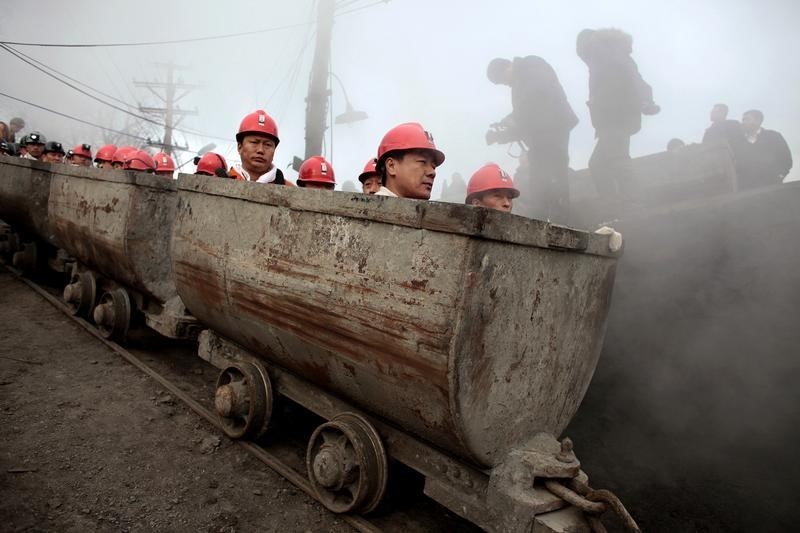(The opinions expressed here are those of the author, a columnist for Reuters.)
By Clyde Russell
LAUNCESTON, Australia, July 27 (Reuters) - There is something of a delicious irony in China's iron ore miners complaining of dumping by foreign producers, but what it really underscores is the multitude of challenges facing the world's biggest steel industry.
The domestic miners want an anti-dumping investigation into iron ore imported from the world's top suppliers, complaining that low-cost majors - Brazil's Vale VALE5.SA and the Anglo-Australian pair of Rio Tinto (LON:RIO) RIO.AX and BHP Billiton (LON:BLT) BHP.AX - are flooding the market. huge volume of low-priced imported iron ore has had a severe impact on the domestic mining industry and even posed a big challenge for the security of steel production," more than 20 Chinese miners said in a statement on the website of the Metallurgical Miners' Association of China.
The call for protection from foreign miners comes against a backdrop of increasing anti-dumping measures on Chinese steel in markets such as Europe, India and the United States.
The Chinese miners' call for measures against iron ore imports can be viewed as the latest salvo in this ongoing war, although it's quite some way to go from a statement on an association website to the authorities in Beijing actually imposing measures.
It's also far from clear that protecting the domestic miners from cheaper imports would actually help China's steel sector, which accounts for about half of the world's total production.
Anti-dumping tariffs on iron ore would only serve to raise the cost of producing Chinese steel, rendering it less competitive in export markets as well as potentially hurting domestic demand growth.
There would also be some doubt as to whether a credible case of dumping could be made against the big three miners, given their success in driving down costs.
Both Rio Tinto and BHP Billiton are able to get a tonne of ore delivered to ports in Western Australia state for around $13 a tonne, meaning that even once royalties, freight and other costs are added, they are still making a healthy profit at current prices.
If it's not ironic enough that China's iron ore miners, many of whom are vertically integrated with the steel producers, are crying for protection at home while condemning it abroad, then the recent jump in spot iron ore prices adds another dimension.
The Steel Index spot iron ore price .IO62-CNI=SI jumped 2.9 percent on Tuesday to $57.40 a tonne, helped by higher steel prices, but also by the news of the call for anti-dumping measures on imported iron ore. IRONORE/
However, the risk is that the brouhaha over anti-dumping measures on iron ore deflects from the real issues in China's steel sector, namely overcapacity and profitability.
RESILIENT STEEL CAPACITY
More important than the fanciful iron ore dumping story was news that China only managed to cut 13 million tonnes of steel-making capacity in the first half of 2016. was less than a third of the annual target and shows the difficulties in shutting down mills when steel prices are rallying, as they did for much of the last six months.
Feng Fei, the vice industry minister, expressed confidence the full-year target of 45 million tonnes can be met, the first year of capacity cuts that are planned to reach a total 140 million tonnes over the next five years.
Given that China's total capacity is around 1.13 billion tonnes a year and production is running at an annualised 800 million tonnes, it's clear even 140 million tonnes of cuts is unlikely to be enough to put the sector on a healthy footing.
The fact China is struggling to cut capacity shows just how much of a challenge the authorities are facing in their bid to return the sector to sustained profitability while minimising the social impact of job losses.
Part of that struggle can be seen in the possibility of what appears to be a forced marriage between listed units of Boasteel 600019.SS , China's second-largest steelmaker, and Wuhan Iron and Steel Group 600005.SS , the sixth-largest. problem is that Boasteel is one of the most modern and efficient Chinese producers, while Wuhan Steel is one of the sector's biggest laggards.
A forced merger of the two state-owned enterprises would only make sense if it results in Wuhan Steel's older and less efficient mills being closed, but there is no guarantee that this would happen.
The need to preserve jobs may trump the need to cut loss-making capacity, and any merger or takeover may be more about politics than profits and the long-term health of the companies.
Overall, while moves towards protectionism from both China's iron ore miners and its overseas steel rivals are certainly a factor, the key for the global steel sector is how quickly and successfully China restructures its own industry.
<^^^^^^^^^^^^^^^^^^^^^^^^^^^^^^^^^^^^^^^^^^^^^^^^^^^^^^^^^^^ Graphic of China's top steel producers
http://tmsnrt.rs/29cCVYe
^^^^^^^^^^^^^^^^^^^^^^^^^^^^^^^^^^^^^^^^^^^^^^^^^^^^^^^^^^^> (Editing by Tom Hogue)
